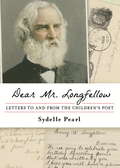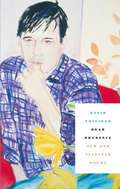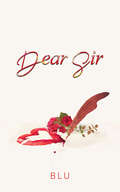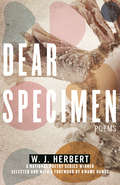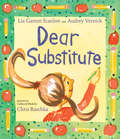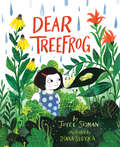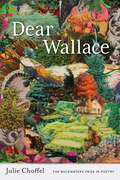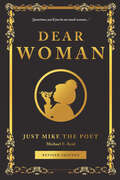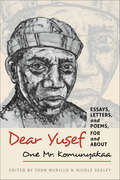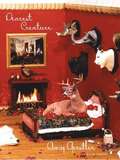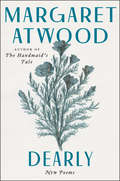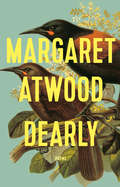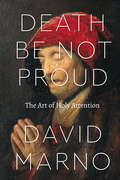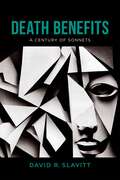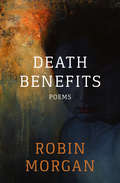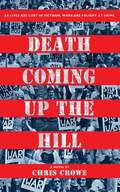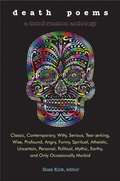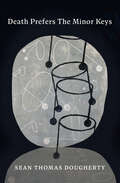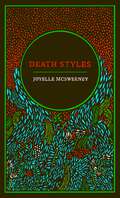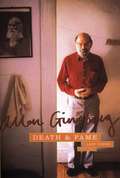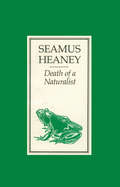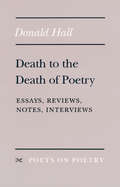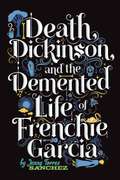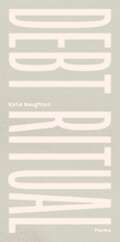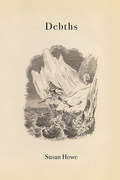- Table View
- List View
Dear Mr. Longfellow
by Sydelle PearlA charming biography that brings to life a famous figure of American literature and a distant, simpler age in the history of our country. If you were attending school in the late-nineteenth century, it's very likely that your teacher would have taught you to memorize lines from "The Village Blacksmith" by renowned poet Henry Wadsworth Longfellow. And on the classroom wall you'd probably see his portrait looking down benignly on you and your classmates. Longfellow was so famous and beloved by youth in this era that he was known as "the children's poet." Students not only memorized his poetry but even knew where his house was in Cambridge, Massachusetts. Children in the vicinity often visited him, and from all over the country they wrote him hundreds of letters. A storyteller and author recounts the life of Henry Wadsworth Longfellow by drawing upon the letters he received from his young admirers. In their letters, children from yesteryear reveal details about their lives that reach across the years to young people today. The letters also highlight the unique, close relationship that children shared with Longfellow. A girl from West Virginia writes, "Thank you so much for writing for children.... It makes us feel that we are not forgotten." Others ask him about what he did as a boy or a young man. In one extraordinary gesture of friendship, the schoolchildren of Cambridge celebrated his birthday by presenting him with a chair created from the wood of the "spreading chestnut tree" made famous in his poem "The Village Blacksmith." Longfellow dedicated his poem "From My Arm-Chair" to these thoughtful children.
Dear Prudence
by David Trinidad"This magnum opus confirms David Trinidad's place in the poetic firmament: he is simply the best we have. A worthy successor to James Schuyler, Trinidad writes soulfully and sometimes photorealistically about the melancholy threshold where dolls and stars become inner objects--dirty, glamorous, destructible. Jacqueline Susann meets Sei Shonagon? Trinidad manages to combine neo-formalist abstraction with dripping gorgeous figuration: Bonnard's wet dream."--Wayne Koestenbaum "This is a volume celebratory in tone, panoramic in scope, funny, and genuinely moving. Trinidad is at the center of what's relevant in his art. And this collection is more vital and more enjoyable than any single performance he has given thus far."--D.A. Powell "Trinidad attends to the present to see into the past with such needle point precision it's like encountering a perfectly appointed movie set where personal memory crosses intimately with cultural memory. Poetic form in Trinidad's hands is a metaphor for staking a claim on the material world even as it slips away in a shimmery Hollywood dissolve--a desperate, doomed reclamation of all that can never be held long enough."--Robyn Schiff "Utterly deadpan and astonishingly fine" is how Publishers Weekly described the poems of David Trinidad. And here is the collection all David Trinidad fans have been waiting for--the first book to have works from all his previous books along with forty new poems: Dear Prudence: New and Selected Poems.
Dear Sir
by Blu…till you receive post Truly inspiring letters, which are double-purposed as poems, are written in the most elegant but modern style, revealing the greatest love in the world: companionship between man and woman.
Dear Specimen: Poems
by W.J. HerbertA National Poetry Series winner, selected and with a foreword by Kwame Dawes.A 5-part series of interwoven poems from a dying parent to her daughter, examining the human capacity for grief, culpability, and love, asking: do we as a species deserve to survive? Dear Specimen opens with both its speaker and her planet in peril. In &“Speak to Me,&” she puzzles over a millipede, as if the blue rune of its body could help her understand her impending death and the crisis her species has created. Throughout the collection, poems addressed to specimens echo the speaker&’s concern and amplify her wonderment. A catalog of our climate transgressions, Dear Specimen&’s final poem foretells a future in which climate refugees overrun one of our planet&’s last habitable places. The collection&’s lifeblood is a series of poems in which the speaker and her daughter express their concern for, and devotion to, one another. The daughter&’s questions mirror the ones her mother asks of specimens: what are we meant to do with so much hazard and wonder? When the speaker hints at the climate crisis in a bedtime story she tells her grandson, we, too, feel the peril he may face. Juxtaposing a profound sense of intimacy with the vastness of geological time, the collection offers a climate-conscious critique of the human species—our search for meaning and intimacy, our capacity for greed and destruction. Dear Specimen is an extended love letter and dire warning, not only to the daughter its speaker leaves behind but to all of us.
Dear Substitute (Hyperion Picture Book (eBook))
by Liz Garton Scanlon Audrey VernickWhen a substitute teacher named Miss Pelly comes to class, one student bristles at the change in routine-Miss Pelly doesn't follow the rules like Mrs. Giordano. But in time, our student learns that even though the substitute may do things a little differently, and she may be a bit silly, mixing things up might not be so bad. Told in a series of epistolary poems, this funny, relatable picturebook is a great fit for classrooms and for any child nervous about new experiences.
Dear Treefrog
by Joyce SidmanCapturing the joy of finding a kindred spirit, this stunning picture book by Newbery Honor–winning poet Joyce Sidman tells the story of a lonely girl moving into a new home and the little treefrog that helps her connect to the beautiful world around her. Perfect for fans of A Butterfly Is Patient and They Saw a Cat.I See You suddenly among the tangled green a tiny dollop of frog where before there was only leaf . . . Are you new here too? When a shy girl moves to a strange new home, she discovers a treefrog perched in a secret spot nearby and learns that sometimes, all it takes to connect with the people and the world around us is a little patience, a curious mind, and a willingness to see the world through a different perspective than your own. With beautiful gouache illustrations by Diana Sudyka and magical, perceptive poems from Newbery Honor–winning author Joyce Sidman, the lives of one tree frog and the girl who discovers it converge, bringing solace, courage, and joy in finding a kindred spirit.
Dear Wallace (The Backwaters Prize in Poetry)
by Julie ChoffelWinner of the Backwaters Prize in PoetryDear Wallace addresses the poet and insurance executive Wallace Stevens in an attempt to reconsider art, power, and creativity amid the demands of everyday responsibility. Exploring relationships between modernism, motherhood, poetry, and privilege, the speaker of these poems puts her daily routines in dialogue with his. Curious, funny, and wry, Julie Choffel confronts Stevens as an unlikely peer who lived and wrote in the same city and weather as she does now, imagining a present-day conversation about the many ways creative practice is informed by social context. As we struggle to marry creative independence with our communal obligations, the questions in these poems are more urgent than ever. Stevens, a proxy for beauty, inventiveness, and legitimacy, becomes an audience for the ennui, anxiety, and politics of care that characterize another kind of writer&’s life today.
Dear Woman
by Michael E. ReidFind the power within yourself to overcome doubts and fears and live in this world as the best woman, friend, daughter, mother, and wife you can be. No one has just one page in their life story. That&’s why Dear Woman has everything—quotes, letters, short stories, and poems to educate, motivate, encourage, and provide a little tough love. This open letter is just as multifaceted and inspirational as you are. Michael E. Read wrote this book because he wants nothing more than for you to be the best woman possible, regardless of circumstance. In Dear Woman, he encourages you to feel the same way. This is more than a self-help book, more than just relationship advice for women—though it does include both of those things. No, this inspirational open letter, full of poetry and wisdom, is life advice just for you. You are an amazing woman. Deep down, you know that. Dear Woman isn&’t here to tell you that you need to improve. Rather, it&’s here to tell you that you can be your true self—for yourself. This is the life advice you need, because you deserve to thrive for no other reason than the fact that you are a woman. Dear Woman was written in hopes of shedding a little light and love. Let it add some brightness to your life. After reading this book, you will: · Love yourself whole-heartedly · Know that you deserve the best · Be confident regardless of what life throws at you
Dear Yusef: Essays, Letters, and Poems, For and About One Mr. Komunyakaa
by John Murillo and Nicole SealeyThis carefully and generously curated mosaic of essays, letters, and poems reveals the profound impact that poet Yusef Komunyakaa has had on poets, educators, and readers worldwide. The anthology brings together creative and critical offerings from fellow poets, former students, literary entities, and other admirers. There are emerging and established voices—from previously unpublished writers to Pulitzer Prize winning poets. Together these pieces honor one of the most influential writers of the last half century, one, it turns out, who is as beloved for his teaching as he is celebrated for his creative work. Contributors include Terrance Hayes, Sharon Olds, Carolyn Forché, Toi Derricotte, and Martín Espada, among others. Dear Yusef affirms Komunyakaa's transformative influence, showcasing how his mentoring has ignited creativity, nurtured passion, and fostered a sense of belonging among countless individuals. Through the artistry of these testimonials, we witness the transformative power of poetry and the enduring legacy of a true literary icon.Please note that the hardcover edition is unjacketed.
Dearest Creature
by Amy GerstlerA surreal new collection from an acclaimed poet Hallucinogenic plants chant in chorus. A thoughtful dog grants an interview. A caterpillar offers life advice. Amy Gerstler’s newest collection of poetry, Dearest Creature, marries fact and fiction in a menagerie of dramatic monologues, twisted love poems, and epistolary pleadings. Drawing on sources as disparate as Lewis Carroll and Mary Shelley’s Frankenstein, as well as abnormal psychology, etiquette, and archaeology texts, these darkly imaginative poems probe what it means to be a sentient, temporary, flesh-and-blood beast, to be hopelessly, vividly creaturely. .
Dearly: New Poems
by Margaret AtwoodA new book of poetry from internationally acclaimed, award-winning and bestselling author Margaret Atwood <P><P>In Dearly, Margaret Atwood’s first collection of poetry in over a decade, Atwood addresses themes such as love, loss, the passage of time, the nature of nature and - zombies. Her new poetry is introspective and personal in tone, but wide-ranging in topic. In poem after poem, she casts her unique imagination and unyielding, observant eye over the landscape of a life carefully and intuitively lived. <P><P>While many are familiar with Margaret Atwood’s fiction—including her groundbreaking and bestselling novels The Handmaid’s Tale, The Testaments, Oryx and Crake, among others—she has, from the beginning of her career, been one of our most significant contemporary poets. And she is one of the very few writers equally accomplished in fiction and poetry. This collection is a stunning achievement that will be appreciated by fans of her novels and poetry readers alike.
Dearly: Poems
by Margaret AtwoodThe collection of a lifetime from the bestselling novelist and poet.By turns moving, playful and wise, the poems gathered in Dearly are about absences and endings, ageing and retrospection, but also about gifts and renewals. They explore bodies and minds in transition, as well as the everyday objects and rituals that embed us in the present. Werewolves, sirens and dreams make their appearance, as do various forms of animal life and fragments of our damaged environment.Before she became one of the world's most important and loved novelists, Atwood was a poet. Dearly is her first collection in over a decade. It brings together many of her most recognizable and celebrated themes, but distilled - from minutely perfect descriptions of the natural world to startlingly witty encounters with aliens, from pressing political issues to myth and legend. It is a pure Atwood delight, and long-term readers and new fans alike will treasure its insight, empathy and humour.
Death Be Not Proud: The Art of Holy Attention
by David MarnoThe seventeenth-century French philosopher Nicolas Malebranche thought that philosophy could learn a valuable lesson from prayer, which teaches us how to attend, wait, and be open for what might happen next. Death Be Not Proud explores the precedents of Malebranche’s advice by reading John Donne’s poetic prayers in the context of what David Marno calls the “art of holy attention.” If, in Malebranche’s view, attention is a hidden bond between religion and philosophy, devotional poetry is the area where this bond becomes visible. Marno shows that in works like “Death be not proud,” Donne’s most triumphant poem about the resurrection, the goal is to allow the poem’s speaker to experience a given doctrine as his own thought, as an idea occurring to him. But while the thought must feel like an unexpected event for the speaker, the poem itself is a careful preparation for it. And the key to this preparation is attention, the only state in which the speaker can perceive the doctrine as a cognitive gift. Along the way, Marno illuminates why attention is required in Christian devotion in the first place and uncovers a tradition of battling distraction that spans from ascetic thinkers and Church Fathers to Catholic spiritual exercises and Protestant prayer manuals.
Death Benefits: A Century of Sonnets
by David R. SlavittDeath Benefits deepens and extends David R. Slavitt’s sublime, lyric confrontation with mortality—and does so in a plainspoken and marvelously entertaining, conversational way. His poetry encourages us to recognize our own predicaments, as we see ourselves reflected as fellow sufferers entrapped by daily circumstance. In his new collection, Slavitt presents a sequence of one hundred sonnets, each one loaded with life, observation, and quicksilver wit. Readers will delight in looking on with wonder, at every turn of the page, to see how the poet will pull it off this time and what kind of linguistic magic he will use to fend off the mortal pain of getting through each day. His voice plays over the grid of the meter in utterly natural intonations. His music squarely faces the dark, but its enduring note is faith in common sense and the pleasure that poetry provides, rather than cynicism or despair.
Death Benefits: Poems
by Robin MorganRobin Morgan&’s lyrical gifts are again on display in this limited edition of four of her most celebrated poems Prostituted women, pimps, Alice B. Toklas, and Bertha Mason—Edward Rochester&’s mad first wife in Jane Eyre—all make appearances in a poem titled &“Battery,&” a word that, in Morgan&’s hands, has surprising meanings. Affirmation underscores the perfect Shakespearian sonnet, &“Birthright,&” as it counsels a defiant gaze at life and death. The life of a flower and the process it undergoes to blossom is the subject of &“Peony,&” with an utterly fresh metaphor that widens to embrace the planet. And the title poem, with its witty play on words, rips through denial in all its forms to find hard but bracing truths.
Death Coming Up the Hill
by Chris CroweIt's 1968, and war is not foreign to seventeen-year-old Ashe. His dogmatic, racist father married his passionate peace-activist mother when she became pregnant with him, and ever since, the couple, like the situation in Vietnam, has been engaged in a "senseless war that could have been prevented." When his high school history teacher dares to teach the political realities of the war, Ashe grows to better understand the situation in Vietnam, his family, and the wider world around him. But when a new crisis hits his parents' marriage, Ashe finds himself trapped, with no options before him but to enter the fray.
Death Poems: Classic, Contemporary, Witty, Serious, Tear-Jerking, Wise, Profound, Angry, Funny, Spiritual, Atheistic, Uncertain, Personal, Political, Mythic, Earthy, and Only Occasionally Morbid
by Russ Kick<p>Pretty much every poet in every age has written about death and dying. Along with love, it might be the most popular subject in poetry. Yet, until now, no anthology has gathered the best and most famous of these verses in one place. <p>This collection ranges dramatically. With more than 320 poems, it goes across all of history, from the ancients straight through to today. Across countries and languages, across schools of poetry. You’ll find a plethora of approaches—witty, humorous, deadly serious, tear-jerking, wise, profound, angry, spiritual, atheistic, uncertain, highly personal, political, mythic, earthy, and only occasionally morbid. <p>Every angle you can think of is covered—the deaths of children, lost loves, funeral rites, close calls, eating meat, serial killers, the death penalty, roadkill, the Underworld, reincarnation, elegies for famous people, death as an equalizer, death as a junk man, death as a child, the death of God, the death of death . . . .</p>
Death Prefers the Minor Keys
by Sean Thomas DoughertyIn his twentieth book, most of which was first composed on the backs of medical forms while on break as a third-shift medical technician, Sean Thomas Dougherty brings us a memoir-like prose sequence reflecting on disability, chronic illness, addiction, survival, love, and parenthood. In Death Prefers the Minor Keys, Dougherty offers the reader collaged prose poems, stories and essays full of dreams, metaphors, aphorisms, parables and narratives of his work as a caregiver. Moving portraits of Dougherty’s residents, a series of letters to Death, invocations of Jewish ancestry through the photography of Roman Vishniac, imaginary treatments for brain injuries, and half translated short stories of lives both real and imagined populate this collection. Through these, Dougherty engages issues of labor, the ontology of disability, and the mysticism of life. Death Prefers the Minor Keys is most of all a kind of love letter to Dougherty’s wife, and her courage and complicity in the face of long-term illness and addiction. Ultimately, we see how the antidote to despair can reside in daily acts of caring for other human beings.
Death Styles
by Joyelle McSweeney'McSweeney is one of our most dynamic poets' Nick Ropatrazone, The Millions'I've never read anything by Joyelle McSweeney that wasn't totally exciting' Dennis CooperOne of LitHub's Most Anticipated Books for 2024In this follow-up to her award-winning collection, Toxicon and Arachne, Joyelle McSweeney proposes a link between style and survival, even in the gravest of circumstances. Setting herself the task of writing a poem a day and accepting a single icon as her starting point, however unlikely - River Phoenix, Mary Magdalene, a backyard skunk - McSweeney follows each inspiration to the point of exhaustion and makes it through each difficult day. In frank, mesmeric lyrics, Death Styles navigates the opposing forces of survival and grief, finding a way to press against death's interface, to step the wrong way out of the grave.
Death and Fame: Poems 1993-1997
by Allen GinsbergAllen Ginsberg was one of the bravest and most admired poets of this century. Famous for energizing the Beat Generation literary movement upon his historic encounter with Gregory Corso, Jack Kerouac, and William Burroughs in mid-century New York City, Ginsberg influenced several generations of writers, musicians, and poets. When he died on April 5, 1997, we lost one of the greatest figures of twentieth-century American literary and cultural history. This singular volume of final poems commemorated the anniversary of Ginsberg's death, and includes the verses he wrote in the years shortly before he died.
Death of a Naturalist
by Seamus HeaneyDeath of a Naturalist (1966) marked the auspicious debut of Seamus Heaney, a universally acclaimed master of modern literature. As a first book of poems, it is remarkable for its accurate perceptions and rich linguistic gifts.
Death to the Death of Poetry: Essays, Reviews, Notes, Interviews (Poets On Poetry)
by Donald HallDonald Hall believes that American poetry, at the present moment, thrives both in quality and in leadership. In his latest collection of essays, reviews, and interviews, Hall counters the increasingly publicized view that poetry has an ever-diminishing importance in contemporary American culture. He resents the endlessly repeated cliché that finds poetry unpopular and losing popularity. Thus: Death to the Death of Poetry. Throughout the pages of this latest offering in the Poets on Poetry series, Hall returns again and again to the theme of poetry's health, and offers essays praising contemporary poets, who serve as examples of poetry's thriving condition. In addition, Death to the Death of Poetry collects interviews in which Hall discusses the work of poetry--revisions, standards, the psychology and sociology of the poet's life. The collection will be warmly received by Donald Hall's large readership, enhanced in 1993 by publication of two exemplary volumes: The Museum of Clear Ideas, his eleventh book of poetry; and his essay Life Work, which brought him both new and returning readers. Donald Hall holds degrees from Harvard and Oxford and was recipient of the Lamont Poetry Selection Award, poetry editor for the Paris Review, and Professor of English, University of Michigan, before returning to his ancestral home in New Hampshire.
Death, Dickinson, and the Demented Life of Frenchie Garcia
by Jenny Torres SanchezTo make sense of her high school crush's suicide, Frenchie retraces her steps the last night she was with him.
Debt Ritual
by Katie NaughtonWinner of the 2023 BUNNY chapbook contest, Katie Naughton’s Debt Ritual sees debt as intensely private yet nevertheless significantly interconnected with global financial systems and other systems of power. Naughton’s text is interested in the way that what appears as money is often funded by debt, while also taking into account the role of art, something that offers social capital without the accompanying wealth. Debt Ritual sets up an equivalence between money and participation in the world and then works to destabilize it. Sized as a dollar bill, Naughton’s book considers the ritualistic use inherent in money and debt and wonders how and if the ritual of art-making replicates -- or interrupts -- the rituals of finance.
Debths
by Susan HoweThe newest collection by one of America’s most exciting poets A collection in five parts, Susan Howe’s electrifying new book opens with a preface by the poet that lays out some of Debths’ inspirations: the art of Paul Thek, the Isabella Stewart Gardner collection, and early American writings; and in it she also addresses memory’s threads and galaxies, “the rule of remoteness,” and “the luminous story surrounding all things noumenal.” Following the preface are four sections of poetry: “Titian Air Vent,” “Tom Tit Tot” (her newest collage poems), “Periscope,” and “Debths.” As always with Howe, Debths brings “a not-being-in-the-no.”
